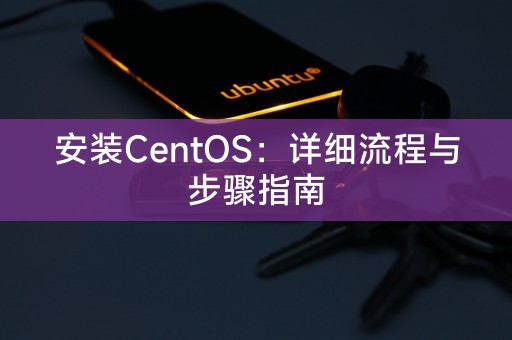Installing CentOS: Detailed Process and Step Guide
Feb 09, 2024 pm 03:45 PMphp editor Apple brings you a detailed process and step guide on installing CentOS. CentOS is a Linux-based operating system widely used in server environments. This article will provide you with concise and concise guidance to help you easily complete the CentOS installation process. From preparing the installation media to setting up partitions and network connections, we will explain it step by step so that you can quickly get started with the CentOS operating system and enjoy excellent performance and stability. Whether you are a newbie or an experienced user, this guide will provide you with a valuable reference. Let’s get started!

Preparation
1. Download the CentOS installation image: Visit the CentOS official website and download the installation image suitable for your computer architecture.
2. Create installation media: Write the downloaded installation image to a USB flash drive or burn it to a CD so that you can start the computer from the media for installation.
Installation process
1. Start the computer: Insert the installation media into the computer, restart the computer and boot from the installation media.
2. Select the installation language: Select the language that suits you on the boot interface.
3. Select keyboard layout: Choose the keyboard layout that suits you.
4. Installation type selection: Select the installation type according to your needs. You can choose basic server installation, installation with graphical interface, etc.
5. Disk partitioning: Partition the computer's disk and allocate storage space for CentOS. You can choose to partition manually or use automatic partitioning tools.
6. Network configuration: Configure the computer’s network connection, including IP address, gateway, etc.
7. Set root password: Set a password for the root user to ensure password security.
8. Create user: Create a non-root user for daily use.
9. Start the installation: After confirming that the above settings are correct, start installing CentOS.
10. Installation completed: Wait for the installation to complete and then restart the computer.
First login and basic configuration
1. Login: Use the created username and password to log in to CentOS.
2. Update the system: Run the system update command to ensure the security and stability of the system.
3. Configure the network: If you need to configure the network in the graphical interface, you can use the network management tool for configuration.
4. Add software sources: Add additional software sources as needed to install more software.
Summary
Through the above steps, you have successfully installed CentOS. During use, you can perform further configuration and management according to your needs. I hope this article can be helpful to you. If so, If you have any questions, please feel free to consult relevant information or seek technical support.
Share with you: A little LINUX knowledge
In Linux system, you can use the command line tool "man" to view the help document of the command. Just enter "man" in the terminal, You can get the detailed description, parameters, usage examples and other information of the command. This is a very practical tool that can help you better understand and use Linux commands.
The above is the detailed content of Installing CentOS: Detailed Process and Step Guide. For more information, please follow other related articles on the PHP Chinese website!

Hot Article

Hot tools Tags

Hot Article

Hot Article Tags

Notepad++7.3.1
Easy-to-use and free code editor

SublimeText3 Chinese version
Chinese version, very easy to use

Zend Studio 13.0.1
Powerful PHP integrated development environment

Dreamweaver CS6
Visual web development tools

SublimeText3 Mac version
God-level code editing software (SublimeText3)

Hot Topics
 Pilet: A Modular, Portable Mini-Computer Powered by Raspberry Pi
Mar 06, 2025 am 10:11 AM
Pilet: A Modular, Portable Mini-Computer Powered by Raspberry Pi
Mar 06, 2025 am 10:11 AM
Pilet: A Modular, Portable Mini-Computer Powered by Raspberry Pi
 Mastering Text Manipulation With the Sed Command
Mar 16, 2025 am 09:48 AM
Mastering Text Manipulation With the Sed Command
Mar 16, 2025 am 09:48 AM
Mastering Text Manipulation With the Sed Command
 Linux Kernel Source Code Surpasses 40 Million Lines
Mar 05, 2025 am 09:35 AM
Linux Kernel Source Code Surpasses 40 Million Lines
Mar 05, 2025 am 09:35 AM
Linux Kernel Source Code Surpasses 40 Million Lines
 The Secret Weapon to Supercharge Your Linux System With Liquorix Kernel
Mar 08, 2025 pm 12:12 PM
The Secret Weapon to Supercharge Your Linux System With Liquorix Kernel
Mar 08, 2025 pm 12:12 PM
The Secret Weapon to Supercharge Your Linux System With Liquorix Kernel
 How To Count Files And Directories In Linux: A Beginner's Guide
Mar 19, 2025 am 10:48 AM
How To Count Files And Directories In Linux: A Beginner's Guide
Mar 19, 2025 am 10:48 AM
How To Count Files And Directories In Linux: A Beginner's Guide
 System76 Introduces Meerkat Mini PC: Big Power in a Tiny Package
Mar 05, 2025 am 10:28 AM
System76 Introduces Meerkat Mini PC: Big Power in a Tiny Package
Mar 05, 2025 am 10:28 AM
System76 Introduces Meerkat Mini PC: Big Power in a Tiny Package
 Building Your Own Ubuntu Personal Cloud: A Step-by-Step Guide to Creating a Secure Data Haven
Mar 05, 2025 am 11:02 AM
Building Your Own Ubuntu Personal Cloud: A Step-by-Step Guide to Creating a Secure Data Haven
Mar 05, 2025 am 11:02 AM
Building Your Own Ubuntu Personal Cloud: A Step-by-Step Guide to Creating a Secure Data Haven
 How To Add A User To Multiple Groups In Linux
Mar 18, 2025 am 11:44 AM
How To Add A User To Multiple Groups In Linux
Mar 18, 2025 am 11:44 AM
How To Add A User To Multiple Groups In Linux







